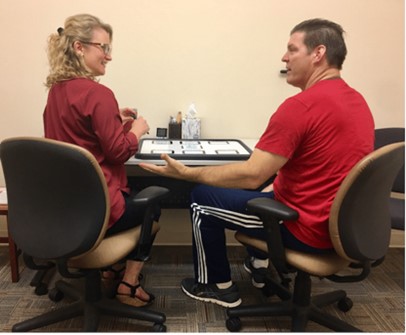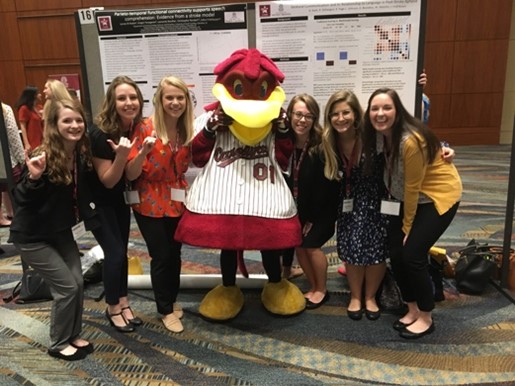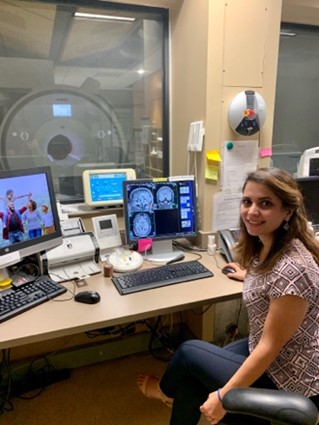Focus
The UofSC Aphasia Laboratory is located on the 2nd floor of the Discovery 1 Research Facility at the University of South Carolina at 915 Greene Street, Columbia, SC 29208.
The research foci of the lab include:
- Understanding the neurophysiology of aphasia recovery in stroke
- Understanding the neurobiology of speech and language.
- Supporting people with aphasia and their families to maximize quality of life.
Much of this research relies on technologies such as magnetic resonance imaging (MRI), including diffusion tensor imaging (DTI), functional magnetic resonance imaging (fMRI), voxel based morphometry (VBM) and lesion symptom mapping (LSM). Brain stimulation techniques such as transcranial magnetic stimulation (TMS) and transcranial direct current stimulation (tDCS) are also utilized in our research.

Research Collaborators
University of South Carolina
Roozbeh Behroozmand, Ph.D.
Dirk B. den Ouden, Ph.D.
Stacy Fritz, Ph.D.
Souvik Sen, M.D., MPH (UofSC School of Medicine)
Jill Stewart, Ph.D
Chris Rorden, Ph.D.
William Matchin, Ph.D.
Rutvik Desai, Ph.D.
Medical University of South Carolina
Janina Wilmskoetter, Ph.D
Johns Hopkins University
Argye Hillis, M.D., M.S.
University of California Irvine
Greg Hickok, Ph.D.
University of Iceland
Sigridur Magnusdottir, Ph.D.
Haukur Hjaltason, M.D.
University of Arizona
Audrey Holland, Ph.D.
Emory University
Leonardo Bonilha, M.D., Ph.D.

Research Funding
“National Institute on Deafness and other Communication Disorders.” Center for the Study of Aphasia Recovery (C-STAR) (P50 DC014664. Funding period: 4/2021-3/2026; funding: $12,376,384). The goal of C-STAR is to advance the treatment of aphasia in the acute and chronic phases of stroke. This project relies on a multi-pronged approach to understand factors that relate to aphasia treatment success and long-term prognosis.
“National Institute on Deafness and other Communication Disorders.” Administrative supplement to Center for the Study of Aphasia Recovery (C-STAR) (3P50 DC014664-06A1SA1). Funding period: 8/2021-3/2022; funding: $223,500). The goal of C-STAR is to advance the treatment of aphasia in the acute and chronic phases of stroke. This project relies on a multi-pronged approach to understand factors that relate to aphasia treatment success and long-term prognosis. This funding supports public sharing of the Aphasia Recovery Cohort data.
“National Institute on Deafness and other Communication Disorders.” Administrative supplement to Center for the Study of Aphasia Recovery (C-STAR) (3P50 DC014664-06A1S2). Funding period: 8/2021-3/2022; funding: $223,500). The goal of C-STAR is to advance the treatment of aphasia in the acute and chronic phases of stroke. This project relies on a multi-pronged approach to understand factors that relate to aphasia treatment success and long-term prognosis. This funding supports advanced neuroimaging visualization for cloud computing ecosystems.
“National Institute on Deafness and Other Communication Disorders.” Administrative supplement to the Center for the Study of Aphasia Recovery (C-STAR) (P50 DC014664-04S1. Funding period: 3/2019-3/2020; funding $372,500). The purpose of this supplement is to investigate long-term treatment effects in aphasia from the perspective of aging. Individuals with aphasia will be followed one-year following aphasia treatment to understand mechanisms underlying variability in treatment gains.
“Excellence Initiative, University of South Carolina.” Aging Brain Cohort at the University of South Carolina (ABC@UofSC) (grant provided to further enhance University efforts that have already achieved success). Funds a research collaboration on brain health among 20+ faculty members at UofSC. The goal is to build a comprehensive cross-sectional and longitudinal database that includes factors related to brain structure and function, genetics, diet, physical health, social status, and neuropsychological testing.
“National Institute on Deafness and other Communication Disorders.” Center for the Study of Aphasia Recovery (C-STAR) (P50 DC014664. Funding period: 4/2016-3/2021; funding: $11,100,000). The goal of C-STAR is to advance the treatment of aphasia in the acute and chronic phases of stroke. This project relies on a multi-pronged approach to understand factors that relate to aphasia treatment success and long-term prognosis.
“National Institute on Deafness and other Communication Disorders.” Trans-cranial Direct Current Stimulation to Treat Aphasia: Phase II Trial (U01 DC011739. Funding period: 4/2012-3/2019; funding: $4,680,000). This is a phase II trial aimed at providing preliminary data to support and definitive phase III trial. The overall goal is to examine the effect of transcranial direct current stimulation on aphasia recovery in chronic stroke.
“National Institute on Deafness and other Communication Disorders.” Speech Entrainment Treatment for Broca’s Aphasia (R21 DC014170. Funding period: 5/2015-4/2019, funding $275,000.00). The purpose of this pilot project is to estimate effect sizes associated with improvements in speech production as a result of speech entrainment treatment (SET) and to examine a new approach to treat Broca’s aphasia and explore patient characteristics associated with treatment response. Currently in no-cost extension until 4/2019.
“National Institute on Deafness and other Communication Disorders.” Brain Connectivity Supporting Language Recovery in Aphasia. (R01 DC014021. Funding period: 6/2014-5/2024; funding: $1,703,101). The aim of this project is to investigate how residual structural brain connectivity enables recovery from aphasia in chronic stroke patients. All data collection for this project is accomplished in our NIDCD supported phase II trial (see above). PI: Bonilha (MUSC)
“National Institute on Deafness and other Communication Disorders.” Integrative Functions of the Planum Temporale. (R01 DC009659. Funding period: 12/2015-11/2019; funding: $3,438,568). The purpose of this grant is to elucidate the role of the planum temporale in speech processing. Work at UofSC focuses on neuropsychological testing and neuroimaging. PI: Hickok (UC Irvine).
“American Heart Association.” Abnormal visual search and motor function in stroke. Funding Period: 07/01/2017 – 06/30/2019; funding: $154,000. This project examines the effects of impaired visual search on visuomotor, functional, and driving performance after stroke. PI: Herter (UofSC)
“National Institute on Deafness and other Communication Disorders.” Sensorimotor processing of auditory feedback in aphasia. (K01 DC015831. Funding period: 7/2017-6/2022; funding: $693,350). This is a training grant that focuses on understanding the role of degraded auditory feedback on speech production in stroke patients with speech and language impairment. PI/Mentee: Behroozmand (UofSC)
“National Institute on Deafness and other Communication Disorders.” Using tDCS to Promote Speech Motor Learning. (K01 DC014298. Funding period: 07/01/2015-06/30/2020; funding: $864,200). The purpose of this training grant is to examine whether non-invasive neuromodulation provided with tDCS (transcranial direct current stimulation) can facilitate speech motor learning in neurotypicals and stroke rehabilitation. PI/Mentee: Buchwald (NYU).
“National Institute on Deafness and other Communication Disorders.” Application of graph theory to both resting-state and task-based fMRI data to uncover brain-behavior relationships related to therapy outcomes in aphasia. (R21 DC016708. Funding period: 6/1/2018-5/30/2021; funding: $300,000). The major goal of this project is to contribute to the understanding of treatment-induced neural reorganization in persons with aphasia by applying innovative and informative techniques to uncover brain-behavior relationships related to both direct training (via trained abstract words) and generalization (via untrained concrete words) effects of therapy. PI: Sandberg (PSU)

